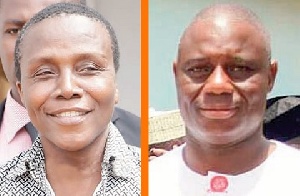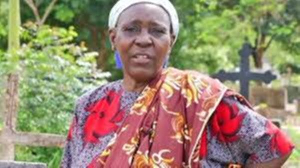On this day April 6, 2009 (Exactly 12 years ago today) the Chief Executive Officer of Asante Kotoko Sporting Club, Sylvester Asare-Owusu was banned from all football-related activities for five years for his involvement in the stadium disaster during a Week 9 Glo Premier League match between his club and arch-rivals Accra Hearts of Oak.
Four persons lost their lives and over 400 persons sustained various degrees of injuries due to overcrowding at the 40,000-capacity stadium during the February 8, 2009 clash.
The Asante Kotoko Chief Executive Officer had openly declared that he took monies from fans who scaled over the wall of the Baba Yara Stadium to watch the game.
After a critical review of the Five-member Committee’s report, Alhaji Mohammed Muntaka Mubarak, Minister of Youth and Sports said government takes a serious view of the conduct of the Asante Kotoko CEO in view of his position and the responsibility that comes with it.
“Mr. Asare-Owusu will be charged for stealing and prosecuted accordingly. In addition, the amount of 820 Ghana Cedis, which he declared to the public as the amount he collected at the stadium during the match will be retrieved and paid to the government chest."
“Mr. Sylvester Asare-Owusu is also banned from all football-related activities in the country for the next five (5) years.”
The banning of Asare-Owusu and the removal from office of the National Sports Council boss, Prince Ernest Oduro-Mensah was described as the highest points of the government’s actions on the recommendations of the Committee.
The Regional Sports Development Officer, Mr. S. Kofi Doku-Doudu, and Deputy Accountant of the National Sports Council, Mr. J.H. Arthur were also asked to resign and proceed on leave respectively.
Two Police Officers, Superintendent Antwi-Boasiako and DSP V.O. Abrokwa were also penciled for interdiction from the Police Service.
The Minister said the Attorney General’s office would be requested to determine appropriate compensation packages to the four bereaved families since the deaths of the fans occurred as a result of the negligence of duty by security on duty at the stadium.
Alhaji Mubarak said part of the Committee’s recommendation includes the classification of matches in the country into three categories; A, B, and C.
“Category A matches will involve matches involving national teams as well as the nation’s most supported clubs Kumasi Asante Kotoko and Accra Hearts of Oak."
“Category B will involve matches involving Hearts or Kotoko against other clubs, while Category C is made-up of matches involving all other clubs.”
The Minister of Youth and Sports pledged the government’s commitment towards making the country’s various stadia incident-free whilst urging the media and fans to expose practices by officials that may tend to cause recurrence of such unfortunate incidents in the country.
Elsewhere;
On this day 6 April 1896 (Exactly 125 years ago today) I Summer Olympic Games was opened in Athens, Greece; American athlete James Connolly became the first modern Olympic champion when he won the triple jump (then 2 hops and a jump); later 3rd in the long jump, 2nd in the high jump.
Officially known as the Games of the I Olympiad, was the first international Olympic Games held in modern history. Organized by the International Olympic Committee (IOC), which had been created by Pierre de Coubertin, it was held in Athens, Greece, from 6 to 15 April 1896.
Fourteen nations and 241, all-male, athletes took part in the games. Participants were all European, or living in Europe, with the exception of the United States team. Winners were given a silver medal, while runners-up received a copper medal. Retroactively, the IOC has converted these to gold and silver and awarded bronze medals to third-placed athletes.
Ten of the 14 participating nations earned medals. The United States won the most gold medals, 11, host nation Greece won the most medals overall, 46. The highlight for the Greeks was the marathon victory by their compatriot Spyridon Louis. The most successful competitor was German wrestler and gymnast Carl Schuhmann, who won four events. Over 65% of the competing athletes were Greek.
Athens had been unanimously chosen to stage the inaugural modern Games during a congress organized by Coubertin in Paris on 23 June 1894, during which the IOC was also created because Greece was the birthplace of the Ancient Olympic Games.
The main venue was the Panathenaic Stadium, where athletics and wrestling took place; other venues included the Neo Phaliron Velodrome for cycling and the Zappeion for fencing. The opening ceremony was held in the Panathenaic Stadium on 6 April, during which most of the competing athletes were aligned on the infield, grouped by nation.
After a speech by the president of the organizing committee, Crown Prince Constantine, his father officially opened the Games. Afterward, nine bands and 150 choir singers performed an Olympic Hymn, composed by Spyridon Samaras, with words by poet Kostis Palamas.
The 1896 Olympics were regarded as a great success. The Games had the largest international participation of any sporting event to that date. The Panathenaic Stadium overflowed with the largest crowd ever to watch a sporting event.
After the Games, Coubertin and the IOC were petitioned by several prominent figures, including Greece’s King George and some of the American competitors in Athens, to hold all the following Games in Athens.
However, the 1900 Summer Olympics were already planned for Paris and, except for the Intercalated Games of 1906, the Olympics did not return to Greece until the 2004 Summer Olympics, 108 years later.
On this day 6 April 1991(Exactly 39 years ago today) Argentine soccer star Diego Maradona was suspended for 15 months by Italian League for testing positive for cocaine use
On this day 6 April 1900(Exactly 121 years ago today) James J Jeffries knocked out Jack Finnegan in round1 for the heavyweight boxing title at the Cadillac A.C., Detroit, Michigan, United States
Sports News of Tuesday, 6 April 2021
Source: ghanasoccernet.com

















